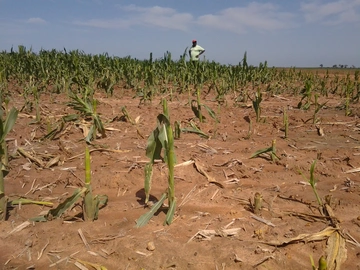G20 discussions on private investment in Africa must include focus on agriculture, say food security experts of the Malabo Montpellier Panel
July 06, 2017.
The <link http: www.mamopanel.org external-link-new-window internal link in current>Malabo Montpellier (MaMo) Panel – a leading voice in African food security and agriculture policy – welcomes the G20 agenda focus on Africa but urges world leaders to ensure the continent’s farmers are at the heart of their discussions in Hamburg this weekend. To leave them out would continue to put African food security and financial stability at risk.
Boosting sustainable economic growth, investment and stability in Africa has been a key objective of the German G20 presidency. The MaMo Panel calls on the G20 to prioritise investment in the agriculture sector as part of this, since it is the continent’s biggest employer. The Panel’s research demonstrates how a flourishing African farming sector could have a significant impact on food security, employment and wealth distribution.
MaMo Panel members chaired an advisory committee which contributed to the <link http: www.bmz.de en publications type_of_publication information_flyer information_brochures materialie295_berlin_charta.pdf>Berlin Charter - handed to German Development Minister Dr. Gerd Müller - to present at the G20. The Charter recommends ways that national governments, development partners and financial institutions can support African youth and create rural jobs.
Prof. Joachim von Braun, Co-Chair of the MaMo Panel and ZEF-Director, said, “There are huge opportunities for young people and women waiting to be realised in Africa. Across the continent, innovations are driving agriculture productivity and increasing participation, especially in rural areas. However, without adequate investment, these will fail to achieve their potential, which will have a negative impact on jobs and livelihoods.”
“By taking the recommendations of the Berlin Charter on board in the G20 discussions about Africa, world leaders could unlock these possibilities to help stabilise food security and drive job creation and overall economic growth,” underlines Dr. Agnes Kalibata, President of the Alliance for a Green Revolution in Africa (AGRA), and a MaMo Panel member.
The Charter calls on the G20 to commit to significant, quantified and time-bound targets in line with the Sustainable Development Goals, in particular to:
- lift at least 600 million people out of hunger and undernutrition with appropriate agricultural, nutrition and anti-poverty policies
- take concerted political and humanitarian actions to immediately end the food crises situations
- facilitate access to education and youth training and to cut youth under employment by half by 2025
- invest in rural infrastructure and job creation policies at cross-national scale
- provide access for all to information technology - including apps for farmers
- realise the enormous potential of farmers in Africa through legal rights, access to finance and insurance
- reverse loss of biodiversity and degradation and implement the Paris Agreement
Dr. Katrin Glatzel, the MaMo Panel’s Program Leader said: “The aim of the Charter is to provide a forward-looking and modern vision of rural Africa and to motivate decision-makers to step up and do their utmost. Food security cannot be achieved without investment and global leaders at the G20 and beyond need to adequately plan how to stimulate that.”
- ENDS -
For more information, a copy of the Berlin Charter or to arrange interviews please contact
Katie Ward
<link>katie@digacommunications.com
+44 7900 241608
or Hawa Diop, MaMo Senior Communications Specialist
<link>H.Diop@cgiar.org
About the Malabo Montpellier Panel
The Malabo Montpellier Panel consists of 12 African and 5 European experts specializing in agriculture, ecology, nutrition, public policy and global development. They promote the aims of the Malabo Declaration which commits 54 signatory countries to halve the number of people in poverty by 2025 through inclusive agricultural growth that creates job opportunities especially for young people and women. Signatory countries commit to allocate at least 10 per cent of public expenditure to agriculture, and to sustain annual agricultural GDP growth of at least 6 per cent. The Panel’s research reports guide decision makers to effectively implement policies and programmes that benefit smallholder farmers in Africa.
<link http: www.mamopanel.org>www.mamopanel.org



